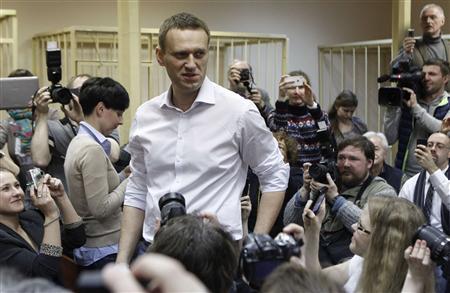Putin foe Navalny defiant as trial opens in Russia

Russian opposition leader and anti-graft blogger Alexei Navalny (C) looks on surrounded by journalists after arriving for a court hearing in the city of Kirov April 17, 2013.
Credit: Reuters/Maxim Shemetov
KIROV, Russia |
(Reuters) - Protest leader Alexei Navalny accused Russian authorities of fabricating charges against him at the start of a trial on Wednesday that he says is intended to crush opposition to Vladimir Putin.
The anti-corruption blogger, 36, was calm and defiant during a 40-minute appearance in court in the provincial city of Kirov before Judge Sergei Blinov adjourned proceedings until April 24 to give the defense more time to prepare its case.
Navalny could face 10 years in jail if convicted of stealing 16 million roubles ($510,000) from a timber firm in Kirov that he was advising in 2009 while working for the liberal regional governor.
The most prominent opposition leader to be tried in post-Soviet Russia, Navalny has suggested Putin ordered the trial to sideline him as a potential presidential rival.
"The case is totally falsified, trumped up. I am completely innocent," he told reporters in court, reiterating his belief that he would be convicted regardless of the evidence.
Casually dressed in an open-necked shirt with no tie or jacket, Navalny chatted casually with reporters and thanked them for attending. His wife Yulia sat calmly in court behind him, flanked by opposition leader Boris Nemtsov.
Tall and clean-cut, Navalny has been a thorn in the side of the government since starting to campaign online against state corruption in 2007. He established himself as a powerful speaker at anti-Putin demonstrations that flared 16 months ago.
Hundreds of people rallied in support of Navalny in central Moscow on Wednesday evening, but the wave of protests against Putin's 13-year domination of Russia has ebbed. On the muddy streets of industrial Kirov, few showed sympathy with Navalny.
"He is probably guilty of something," said Anya, a young woman selling toy cars in the main square of Kirov, almost 900 km (550 miles) northeast of Moscow and dominated by grey Soviet-era buildings.
"His supporters would say this is political, of course, but I think there must be more to it since the case has gone this far," she said.
Grigory Pandzensky, a student, said: "It looks like he's guilty ... It would be best if he went to jail."
MAKING AN EXAMPLE
The Kremlin sees little risk in making an example of Navalny to discourage dissent because conservative voters in the provinces - Putin's traditional support base - are either indifferent or likely to welcome a jail sentence for Navalny.
A recent opinion poll indicated about 37 percent of Russians know who Navalny is, a sharp increase in the past two years, but only 14 percent would vote for him in a presidential election.
"People like him give me hope that I will live in a normal country some day," Tatyana Styopkina, 66, said at the rally in support of Navalny in Moscow's Pushkin Square on Wednesday.
"Everyone here knows very well that Navalny is not guilty of anything he is being accused of," veteran human rights activist Lyudmila Alexeyeva, 85, told the crowd, prompting cheers and applause. "He is being persecuted for fighting corruption."
Navalny is rarely seen on state television, the main source of news for the millions of Russians outside the big cities.
Since Putin's return to the Kremlin last May after four years as prime minister, two members of the dissident band Pussy Riot have been jailed, a prominent protest leader has been thrown out of parliament and another is under house arrest.
A dozen protesters also face sentences of up to 10 years over clashes with police at a rally on the eve of Putin's inauguration last May, and parliament has pushed through tough new penalties and fines for demonstrators who stray out of line.
A spokesman for Russia's Investigative Committee, which answers to Putin, said on Friday the case against Navalny had been speeded up because he had done "everything in his power to attract attention to himself" and taunt the authorities.
Putin's spokesman Dmitry Peskov has denied the president uses the courts for political ends and says the Kremlin leader will not be following the trial.
Navalny's case has caused international concern and two Western diplomats were among those packed into the small Leninsky Court. They declined comment.
Former finance minister Alexei Kudrin, who still has the ear of the Kremlin, said the trial brought to mind the idea of "time travel" back to the Soviet era and warned that it "calls into question the basics of the market economy".
Navalny's supporters in Kirov said they would keep supporting him. In a show of defiance, they have made the password for their Internet account navalny2018, a reference to the year when the next presidential election is scheduled.
(Additional reporting by Alissa de Carbonnel in Moscow; Writing by Timothy Heritage and Alissa de Carbonnel; Editing by Andrew Roche)
![]()
© Thomson Reuters 2013 All rights reserved
http://www.reuters.com/article/2013/04/17/us-russia-navalny-idUSBRE93G05U20130417